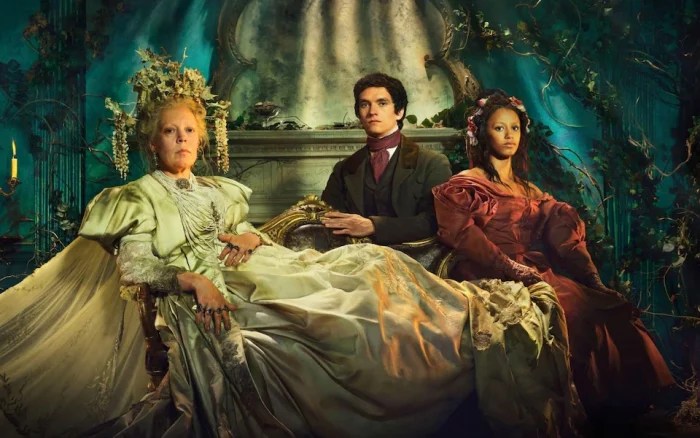Allow me to introduce you to a fun game you can play in your own parlour. You take it in turns for someone to shout out the title of a pre-21st century literary classic. The other player responds by giving the blurb of a 21st century television adaptation. It might go, for example; ‘Middlemarch!’ ’ A searing, never-more-relevant exposé of the rural chemsex scene starring Sophie Okonedo’. Or possibly; ‘Mapp and Lucia!’ ‘Benedict Cumberbatch and Eddie Izzard are locked in combat with the county lines gangs of the Sussex coast’. Or even: ‘Jane Eyre!’ ‘Lesley Manville and Cush Jumbo star in this accessible tale of the devastating mental health impacts of Tik-Tok addiction’.
Nothing sums up this syndrome – the ‘relevant’ TV classic – better than the curious puff piece in the Telegraph this weekend for the BBC/FX’s new Great Expectations, to start next Sunday night. Yes, it’s Dickens. Oh no, groan, how stuffy, yawn. But wait – it’s funky! With swearing and violence and ethnic actors in it!
A sexed-up Dickens with multi-ethnic casting is the most predictable thing, like Tuesday following Monday
Such articles are a mainstay of the broadsheet culture sections. They belong to the same strain as the pieces that tell us that Kylie Minogue has cast aside her girl-next-door look for a new sexy image, that the new Doctor Who assistant is less of a screamer, and that the next James Bond will be more sensitive and a ‘new man’. We hear them again and again and again, and each time we are supposed to be stopped dead in our tracks.
A sexed-up Dickens with multi-ethnic casting is exactly what anyone and everyone would expect. It is the most predictable thing, like Tuesday following Monday. And yet every time the makers expect our gobs to be smacked, and the media scream ‘whoa Nellie, bit daring!’
The Telegraph tells us that the cast and crew of the new Great Expectations describe it as ‘relatable’, as if a BBC Sunday night audience simply could not engage with anything that wasn’t about drugs, violence, the class system and colonialism. Hilariously the piece reports, ‘… the dynamic between Estella and her bullying adopted mother Miss Havisham – played by a ghastly, ghostly, acid-tongued Olivia Colman in a wedding dress – is one that is sadly all-too-familiar in modern Britain’. Now, I count myself a keen observer of the social scene, and I hadn’t noticed this. If you are one of the legions of young women being psycho-sexually tormented by a relative who lurks in a candle-lit grotto 24/7 throwing bitter curses at a cobwebbed wedding cake, do write in to set me straight.
The report also raves that the casting is ‘refreshingly diverse’, as if no ethnic actors have appeared in historical drama over the last twenty years. Presumably the author missed David Copperfield, The Hollow Crown, and er … everything else. Colourblind casting in period drama is only fair. The slight artistic awkwardness comes because our culture simultaneously treats skin colour like hair and eye colour and as the most important thing about a person.
Actor Ashley Thomas (aka rapper Bashy) who plays Mr Jaggers – the highly successful Victorian lawyer – tells the Telegraph there were 15,000 black people living in London by 1760. Fair enough. The trouble comes when we are expected to believe that the country was full of perfectly integrated, thriving people of colour and was also – at the very same time – a hotbed of virulent racism and colonialism.
Elsewhere Fionn Whitehead, who plays hero Pip, reveals that he hasn’t read Great Expectations as he couldn’t ‘even try to decode the language’. Terrifying, difficult, archaic language such as ‘I was too cowardly to do what I knew to be right’ or ‘It was one of those March days when the sun shines hot and the wind blows cold’. But don’t worry, because Fionn hopes this version is more ‘accessible to young people’ because he gets to swear in it.
Whitehead is as keen on history as English. He says: ‘The British Empire was a horrible thing … massively powered by greed … if there’s anyone walking around believing that the Empire was a great thing they are clearly kidding themselves.’ Strong stuff! And I was just on my way to invade Namibia. Fionn is a very good example of the rule that you must never let actors say anything that you haven’t already written down for them.
‘Relatable’ and ‘accessible’ are TV speak for things with minorities and violence and swearing in, because that’s the picture TV people have of the country. The TV industry adores compliant creatives who feed this febrile fantasy of the country and their own puerile politics, with its silly, reductive view of approved ‘identities’, back at them. As a a TV writer, I could have been among their number if only I could have conquered my inability to keep a straight face when surrounded by this guff.
The last thing anyone needs is more TV Dickens. The only reason these things are made is that they are familiar – in fact, ancient – brands that guarantee at least a first-night audience out of sheer curiosity. If I ruled the TV and film world, I would impose a moratorium on remakes and adaptations for twenty years to replenish the stocks of the industry’s moribund imaginations.







Comments